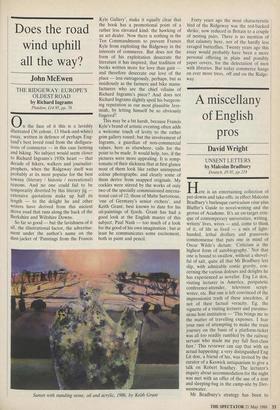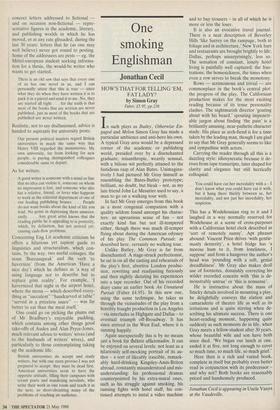A miscellany of English pros
David Wright
UNSENT LETTERS by Malcolm Bradbury
Deutsch, £9.95, pp.218
Here is an entertaining collection of put-downs and take-offs: in effect Malcolm Bradbury's burlesque curriculum vitae plus Bluffer's Guide to novel-writing and the groves of Academe. It's an on-target criti- que of contemporary universities, writing, writers' lives, wives — and, come to think of it, of life as lived — a mix of light- handed, lethal drollery and grassroots commonsense that puts one in mind of Oscar Wilde's dictum: 'Criticism is the highest form of autobiography.' Not that one is bound to swallow, without a shovel- ful of salt, quite all that Mr Bradbury lets slip, with admirable comic gravity, con- cerning the various dolours and delights he has experienced as novelist, Eng Lit don, visiting lecturer in America, peripatetic conference-attender, television script- writer, etc. But one is left convinced of the impressionist truth of these anecdotes, if not of their factual veracity. Eg. the vignette of a visiting lecturer and parsimo- nious host institution — 'This brings me to the matter of travelling expenses. I fear your ruse of attempting to make the train journey on the basis of a platform-ticket was all too readily rumbled by the railway servant who made me pay full first-class fare.' This reviewer can cap that with an actual happening: a very distinguished Eng Lit don, a friend of his, was invited by the curator of a Keswick antiquarium to give a talk on Robert Southey. The ledturer's inquiry about accommodation for the night was met with an offer of the use of a tent and sleeping-bag in the camp-site by Der- wentwater.
Mr Bradbury's strategy has been to concoct letters addressed to fictional and on occasion non-fictional — repre- sentative figures in the academic, literary, and publishing worlds in which he has moved, or at any rate glissaded, during the last 30 years: letters that he (as one may well believe) never got round to posting. Some of the addressees are pests — eg. the Mittel-european student seeking informa- tion for a thesis, the would-be writer who wants to get started.
There is an old saw that says that every one of us has one novel in us, and I can personally attest that this is true — since what they do when they have written it is to pack it in a parcel and send it to me. No, they are started all right . . . for the truth is that most of the books that are written are never published, just as most of the books that are published are never written.
Realistic, not to say disillusioned, advice is handed to aspirants for university posts: Our present political masters regard British universities in much the same way that Henry VIII regarded the monasteries. My own university, far from looking for new people, is paying distinguished colleagues considerable sums to depart.
As for writers:
A good writer is someone with a mind so fine that no idea can violate it, someone on whom no impression is lost, and someone who also has a relative, friend, or lover who happens to work in the editorial department of one of our leading publishing houses. . . . People do not want books about the kind of life you lead. No point in depressing them unneces- sarily. . . . Any great artist knows that the reading public he is appealing to is posterity, which, by definition, has not arrived yet, causing cash-flow problems.
Concerning Eng Lit academic criticism he offers a hilarious yet sapient guide to linguistics and structuralism, which con- tains, by the way, two useful coinages: the noun `Bureauspeak' and the verb 'to havernize' (from the American 'Have a nice day') which he defines as 'a way of using language not to describe but to replace grim reality'. For example, havernized that night in the airport hotel, where the menu — which described every- thing as "succulent" "handcarved at table" "served in a priceless sauce" — was far better to eat than the meal itself.'
One could go on picking the plums out of Mr Bradbury's enjoyable pudding, which contains among other things good take-offs of Auden and Alan Pryce-Jones, much relevant advice to writers' wives (and to the husbands of writers' wives), and particularly to those contemplating taking up the academic life:
British universities do accept and study writers, but with one stern proviso I was not prepared to accept: they must be dead first. American universities seem to have the opposite attitude, filling their campuses with errant poets and wandering novelists, who write their work in one room and teach it in the next, so short-circuiting many of the problems of reaching an audience.































































 Previous page
Previous page